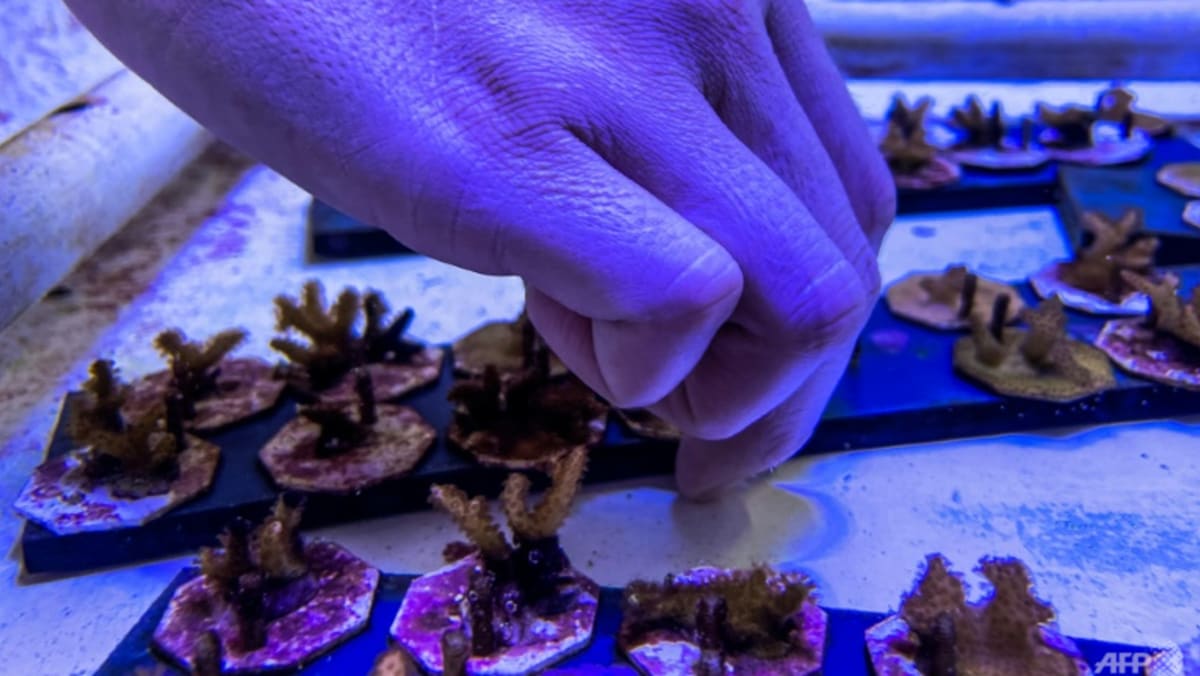Desperate US bid to engineer corals for climate change
MIAMI: A bit of coral shimmers like gold in a US lab as part of urgent work to help the species protect itself from climate change, an effort even skeptical experts see as sadly justifiable.
Researchers in Florida are aiming to determine whether coral can be saved from rising water temperatures and acidification by transplanting stem cells from resistant varieties to those more vulnerable to climate impacts.
In other words, global warming worries have reached a point that scientists are trying to tweak some organisms’ genetics so that they might survive.
“Reefs are dying at an alarming rate and they are not able to keep up with climate change,” Nikki Traylor-Knowles, who heads a University of Miami team working on the coral, told AFP.
“At this point, we’ve just got to try everything and see what works,” she said before nations gathered at the COP26 summit in Glasgow – seen as a last chance to halt catastrophic climate change.
The Florida research is one of a handful of efforts backed by Revive and Restore, a non-profit based near San Francisco that sees genetic engineering as a valuable tool for conservationists working to save plants and animals from doom.
Organisms on Earth have survived in the long run by gradually evolving, or moving to places where the land, habitat or temperature are more hospitable. Climate change is altering the environment too quickly for that to work.
“We don’t have evolutionary time to help species make that kind of adaptation,” Revive co-founder Ryan Phelan told AFP at a California conference.
“We’re going to have to intervene, or we have to let it go,” she said.
The concern for coral is particularly pressing because oceans absorb more than 90 per cent of the excess heat from greenhouse gas emissions, shielding land surfaces but generating huge, long-lasting marine heatwaves.
“WE MAY HAVE TO DO IT”
These are pushing many species of coral – often dubbed the “rainforests of the oceans” for their rich biodiversity – past their limits of tolerance.
Along with pollution and dynamite fishing, global warming wiped out 14 per cent of the world’s coral reefs between 2009 and 2018, according to a survey by the Global Coral Reef Monitoring Network, the biggest ever carried out.
More than half of an US$8 million Catalyst Science Fund for backing biotechnology tools to help solve conservation’s most intractable problems is being poured into coral projects.
“Our thinking is the tools we develop for coral will be generalizable for other marine species,” said Bridget Baumgartner, who coordinates coral projects at Revive.
“We hope we can easily translate them to problems with kelp, oysters, sea stars, what have you.”
Genetic projects backed by Revive and Restore elsewhere in the United States have yielded a black-footed ferret named Elizabeth Ann, cloned from frozen cells decades old, and which could be the salvation of her species.
And a yearling called Kurt being cared for in a California zoo is a resurrected Przewalski wild horse, which had gone extinct.
Though neither are connected to climate change, the creatures’ existence are key to the group’s argument in favor of their genetic work.
Certainly genetic tinkering raises concerns, said Stanford University law and biosciences director Henry Greely, citing potential for deformations or an altered plant or animal causing unexpected consequences in the wild.
Yet he sees saving species, including coral, from decimation as worthy uses of the technology.
“I’m a fan of this approach, if it’s done carefully, with appropriate regulation and prudence,” Greely said of adding genetic technology tools to conservation efforts.
Gregory Kaebnick, a scholar at bioethics research institute The Hastings Center also supported creature-protecting tweaks, and noted the risk of a creation running amok was lower than simply failing to impart durable, effective changes.
“I’m not excited about the prospect of changing coral to let them survive, but it might be something that we have to do,” he added.
For all the latest world News Click Here

